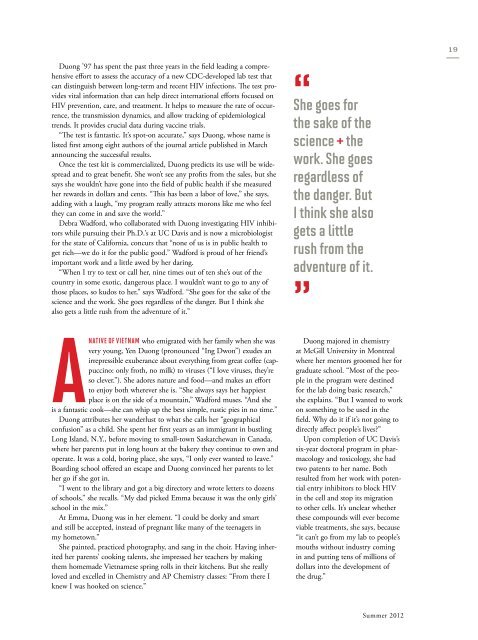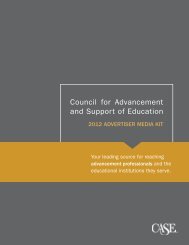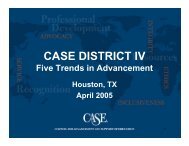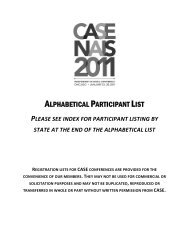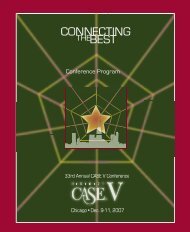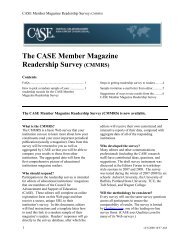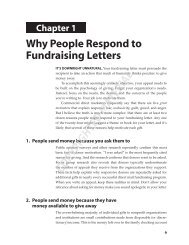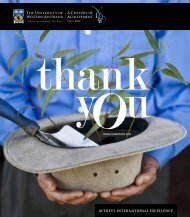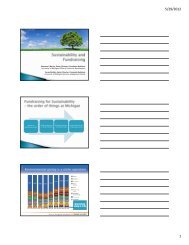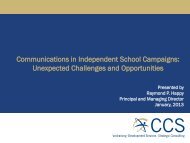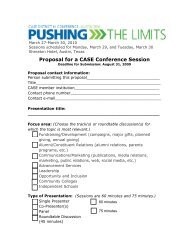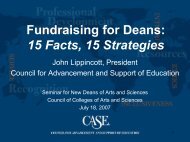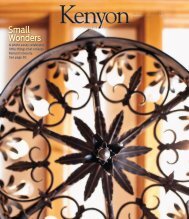Emma Magazine - CASE
Emma Magazine - CASE
Emma Magazine - CASE
- No tags were found...
You also want an ePaper? Increase the reach of your titles
YUMPU automatically turns print PDFs into web optimized ePapers that Google loves.
19Duong ’97 has spent the past three years in the field leading a comprehensiveeffort to assess the accuracy of a new CDC-developed lab test thatcan distinguish between long-term and recent HIV infections. The test providesvital information that can help direct international efforts focused onHIV prevention, care, and treatment. It helps to measure the rate of occurrence,the transmission dynamics, and allow tracking of epidemiologicaltrends. It provides crucial data during vaccine trials.“The test is fantastic. It’s spot-on accurate,” says Duong, whose name islisted first among eight authors of the journal article published in Marchannouncing the successful results.Once the test kit is commercialized, Duong predicts its use will be widespreadand to great benefit. She won’t see any profits from the sales, but shesays she wouldn’t have gone into the field of public health if she measuredher rewards in dollars and cents. “This has been a labor of love,” she says,adding with a laugh, “my program really attracts morons like me who feelthey can come in and save the world.”Debra Wadford, who collaborated with Duong investigating HIV inhibitorswhile pursuing their Ph.D.’s at UC Davis and is now a microbiologistfor the state of California, concurs that “none of us is in public health toget rich—we do it for the public good.” Wadford is proud of her friend’simportant work and a little awed by her daring.“When I try to text or call her, nine times out of ten she’s out of thecountry in some exotic, dangerous place. I wouldn’t want to go to any ofthose places, so kudos to her,” says Wadford. “She goes for the sake of thescience and the work. She goes regardless of the danger. But I think shealso gets a little rush from the adventure of it.”Anative of Vietnam who emigrated with her family when she wasvery young, Yen Duong (pronounced “Ing Dwon”) exudes anirrepressible exuberance about everything from great coffee (cappuccino:only froth, no milk) to viruses (“I love viruses, they’reso clever.”). She adores nature and food—and makes an effortto enjoy both wherever she is. “She always says her happiestplace is on the side of a mountain,” Wadford muses. “And sheis a fantastic cook—she can whip up the best simple, rustic pies in no time.”Duong attributes her wanderlust to what she calls her “geographicalconfusion” as a child. She spent her first years as an immigrant in bustlingLong Island, N.Y., before moving to small-town Saskatchewan in Canada,where her parents put in long hours at the bakery they continue to own andoperate. It was a cold, boring place, she says, “I only ever wanted to leave.”Boarding school offered an escape and Duong convinced her parents to lether go if she got in.“I went to the library and got a big directory and wrote letters to dozensof schools,” she recalls. “My dad picked <strong>Emma</strong> because it was the only girls’school in the mix.”At <strong>Emma</strong>, Duong was in her element. “I could be dorky and smartand still be accepted, instead of pregnant like many of the teenagers inmy hometown.”She painted, practiced photography, and sang in the choir. Having inheritedher parents’ cooking talents, she impressed her teachers by makingthem homemade Vietnamese spring rolls in their kitchens. But she reallyloved and excelled in Chemistry and AP Chemistry classes: “From there Iknew I was hooked on science.”“She goes forthe sake of thescience + thework. She goesregardless ofthe danger. ButI think she alsogets a littlerush from theadventure of it.”Duong majored in chemistryat McGill University in Montrealwhere her mentors groomed her forgraduate school. “Most of the peoplein the program were destinedfor the lab doing basic research,”she explains. “But I wanted to workon something to be used in thefield. Why do it if it’s not going todirectly affect people’s lives?”Upon completion of UC Davis’ssix-year doctoral program in pharmacologyand toxicology, she hadtwo patents to her name. Bothresulted from her work with potentialentry inhibitors to block HIVin the cell and stop its migrationto other cells. It’s unclear whetherthese compounds will ever becomeviable treatments, she says, because“it can’t go from my lab to people’smouths without industry comingin and putting tens of millions ofdollars into the development ofthe drug.”Summer 2012


